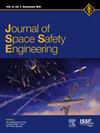Adaptive relative orbit control considering laser ablation uncertainty
IF 1.7
Q3 ENGINEERING, AEROSPACE
引用次数: 0
Abstract
This study proposes a relative orbit control law for laser debris removal missions considering the uncertainties of laser ablation and atmospheric drag. A removal spacecraft irradiates laser pulses to a target debris to generate the ablation force for deorbiting. The deorbiting force lowers the target altitude, and the removal spacecraft must follow it to maintain its relative position for continuous laser irradiation. The difficulty stems from uncertainties of the magnitude of laser ablation and external disturbances such as atmospheric drag. To tackle this problem, this study derives an adaptive control method using the Gaussian process regression to cancel the uncertainties with a nonparametric regression model. Numerical simulations verify the proposed control law under the uncertainties of laser ablation and atmospheric drag. The proposed control law can contribute to the realization of a safer and more secure mission not only for laser debris removal missions, but also for other on-orbit services.
考虑激光烧蚀不确定性的自适应相对轨道控制
考虑到激光烧蚀和大气阻力的不确定性,本研究提出了激光碎片清除任务的相对轨道控制法则。清除飞船向目标碎片照射激光脉冲,产生烧蚀力使其脱轨。脱轨力会降低目标高度,移除航天器必须紧随其后,以保持持续激光照射的相对位置。困难在于激光烧蚀力大小的不确定性以及大气阻力等外部干扰。为解决这一问题,本研究利用高斯过程回归推导出一种自适应控制方法,通过非参数回归模型消除不确定性。数值模拟验证了在激光烧蚀和大气阻力的不确定性下所提出的控制法则。所提出的控制法则不仅有助于激光碎片清除任务,也有助于其他在轨服务实现更安全可靠的任务。
本文章由计算机程序翻译,如有差异,请以英文原文为准。
求助全文
约1分钟内获得全文
求助全文
来源期刊

Journal of Space Safety Engineering
Engineering-Safety, Risk, Reliability and Quality
CiteScore
2.50
自引率
0.00%
发文量
80
 求助内容:
求助内容: 应助结果提醒方式:
应助结果提醒方式:


